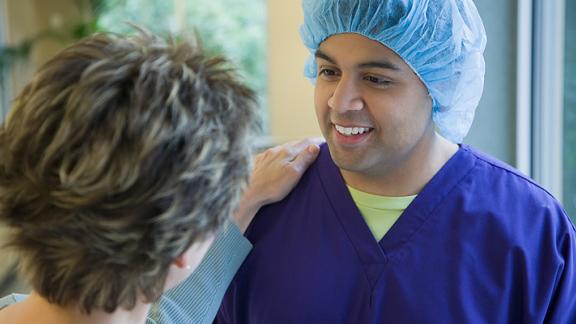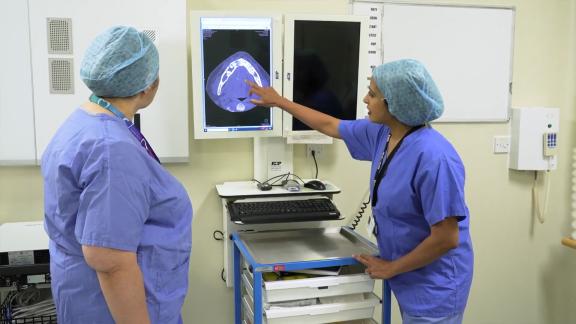SAS doctor development

Specialty, associate specialist and specialist (SAS) doctors and dentists are a diverse group with a wide range of skills, experience, and specialties.
Although the specialty doctor and specialist grades are the only grades open to new entrants, the SAS grade comprises of staff grade doctors, associate specialists, hospital practitioners, clinical assistants, senior clinical medical officers and clinical medical officers. Ensuring that SAS doctors receive effective development benefits patient safety and employers, as well as the individual doctor. Good patient experience is strongly associated with a motivated and engaged workforce where every individual has the opportunity to work at their full potential.
Investing in development is a step to achieving that which will inevitably better equip these doctors to meet the needs of the service and improve patient care.
SAS doctor development guide
The SAS doctor development guide aims to make sure that this important group of doctors remains fit to practice and develop in their careers. The guide was updated in partnership by the British Medical Association (BMA), British Dental Association (BDA), Health Education England (HEE), the Academy of Medical Royal Colleges and NHS Employers in September 2020. This updated version includes new case studies and updated sections on continuing professional development, autonomous working and extended roles.
SAS job planning
Job planning should take into account the career development and aspirations of the doctor.
Read our job planning guidance for specialty and associate specialists. This guidance reflects a shared understanding of the key principles which should characterise a collaborative approach to the job planning process.
Maximising the potential: essential measures to support SAS doctors
The HEE and NHS Improvement (NHSI) March 2019 report Maximising the potential: essential measures to support SAS doctors sets out measures to give SAS doctors access to improved support and better development opportunities. SAS doctors make up 20 per cent of the medical workforce but many say they lack workplace support, find it hard to move between specialties, have limited access to training and some have reported bullying.
Through implementation of the shared commitments in the report, HEE along with NHSI, NHS Employers and other partners will work together to improve opportunities for SAS doctors to advance as clinicians and leaders in healthcare, to improve the knowledge of what they do among other healthcare professionals and to promote SAS as an attractive career option.
Coding work to SAS doctors
We support the principle of coding patients under the person responsible for their care, which may often be a SAS doctor. Accurate patient coding forms one of the many recommendations outlined in the SAS charter.
Every SAS doctor should have appropriate IT support to ensure transparency of NHS data and provision of care as well as attribution of work to appropriate clinicians. Accurate patient coding is important for a number of reasons:
- it is good medical practice for patients and their families to know the name of the senior doctor in charge of caring for a patient
- a reliable record of activity is important for revalidation
- for appraisal and pay progression to accurately audit who has undertaken what work
- for staff morale and job satisfaction.
The NHS e-Referral Service has a patient coding functionality which enables the coding of named clinicians, including SAS doctors. For more information read the British Medical Association's local negotiating committee briefing on referrals and coding
Dignity at work
Everyone deserves to be treated with dignity and respect at work and bullying and harassment is not acceptable. A 2015 BMA survey of SAS doctors found that more than a third had experienced bullying, harassment or victimisation at work over the preceding 12 months. A later survey by the GMC in 2019 showed again that 30 per cent reported being bullied, undermined or harassed in the preceding 12 months.
You can find more helpful information on our bullying in healthcare pages.
Professionalism and cultural transformation toolkit
The Professionalism and Cultural Transformation (PACT) toolkit can be used to improve professional attitudes and behaviours in the workplace. The toolkit is based on the principles of work undertaken by Hull University Teaching Hospitals NHS Trust and is designed to support managers to embed the PACT programme in their organisation and includes practical information, advice and solutions. The toolkit encourages staff to ‘make a PaCT’ and take positive steps to improve the culture of the organisation.
Use of the term middle grade
SAS doctors should be referred to by the contract they are on, for example specialty doctors, specialists, associate specialists or in short, SAS doctors.
Employers are advised not to use the term middle grade to refer to SAS doctors as there is no such grade. Employers are also advised not to use the term middle grade rota but instead use more acceptable terms such as SAS rota or where the staff groups are mixed, it may also be referred to as higher specialty trainee and SAS rota.



